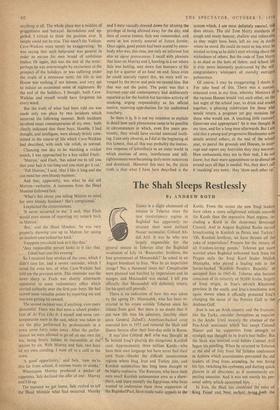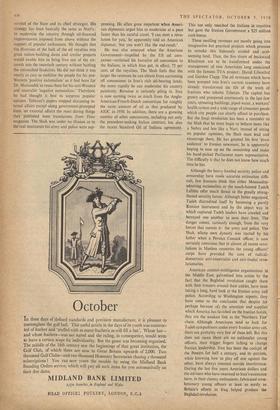The Shah Sleeps Restlessly
By ANDREW ROTH
THERE is a slight abatement of tension in Teheran since the new revolutionary regime in Baghdad has apparently re- strained their most militant Nasser nationalist, Colonel Ab- dul Arif. It was he who was largely responsible for the general unease in Teheran after the Baghdad revolution of July 14. 'Remember, brethren, the free government of Moussadek?' he asked in an August broadcast to Iran. 'Was he an imperialist stooge? No, a thousand times no! Conspiracies were planned and hatched by imperialism and its stooges, and Moussadek was ousted. I tell you officially that Moussadek will definitely return, for his spirit still prevails.'
There is no indication of how this was taken by the ageing Dr. Moussadek, who has been re- stricted to his estate outside Teheran since his release from gaol. But there is no doubt that it put • new life into his admirers, forcibly silent since General Zahedi'•s, American7backed coup unseated him in 1953 and restored the Shah and Queen Soraya after their four-day exile in Rome.
It was also Colonel hrif who was thought to 'fie behind Iraq's playing the dangerous Kurdish card. Approximately three million Kurds—who have their own language but have never had their own State—iiihabit the difficult mountainous regions where Iraq, Iran and Turkey join, and Kurdish nationalism has long been thought to be highly. explosive. The Russians, who have their own small Kurdish autonomous area as a show- .piece, and more recently the Egyptians, who have wanted to undermine these three supporters of the BaghdadTact,,have made radio appeals to the Kurds. From the outset the new Iraqi leaders have taken a more enlightened attitude towards the Kurds than the repressive Nuri regime, in- cluding a Kurd in the three-man Sovereign Council. And in August Baghdad Radio started broadcasting in Kurdish to Persia and Turkey : 'Oh, Kurdish brethren, we have thrown off the yoke of imperialism ! Prepare for the victory of all freedom-loving people.' Teheran got more worried when Baghdad welcomed back from his Prague exile the Iraqi Kurd leader Mullah Mustapha, who played a leading role in the Soviet-backed 'Kurdish People's Republic' in occupied Iran in 1945-46. Teheran also became conscious of its minority of 50,000 Arabs, largely of Iraqi origin, in Iran's oil-rich Kbuzistan province in the south, and Iran's touchiness was again shown when it officially protested Iraq's changing the name of the Persian Gulf to the ' Arabian Gulf.
Iran is not an .Arab country and the Iranians, like the Turks, consider themselves as superior to the Arabs. Until recently the absence of the Pan-Arab sentiment Whidh has swept Colonel Nasser and his, supporters from strength to strength was thought to be Iran's best buffer. But the Shah Was 'worried even before Colonel Arif began his needling. When he returned to Teheran at the ehd of July from the fahious conference in Ankara which assassination prevented the old leaders of • Iraq from attending, he was biting his lips, twitching his eyebrows ,and darting quick glances in all directions as if momentarily ex- pecting assassins. And it was not merely his per- sonal safety :which concerned him. .
In Iran, the Shah hiis combined the roles of King Feisal and Nuri esSaid, being thoth the symbol of the State and its chief strategist. His strategy has been basically the same as Nuri's to modernise the country through oil-financed improvements imposed from above without the support of popular enthusiasm. He thought that the diversion of the bulk of the oil royalties into great nation-building dams and similar projects would enable him to bring Iran out of the six- teenth into the twentieth century without battling the entrenched feudalists. He did not think it was nearly as easy to mobilise the people for his pro- Western 'positive nationalism' as it had been for Dr. Moussadek to rouse them for his anti-Western and neutralist 'negative nationalism.' Therefore, he had thought it best to suppress popular opinion. Teheran's papers stopped discussing in- ternal affairs except along government-prompted lines; on external affairs the most daring things they published were translations from Time magazine. The Shah was under no illusion as to the real sentiments his army and police were sup- pressing. He often grew impatient when Ameri- can diplomats urged him to modernise at a pace faster than his careful crawl. 'I can start a revo- lution for you,' he apparently told an American diplomat, 'but you won't like the end-result.'
He was also annoyed when the American Government—impelled by the US oil com- panies—criticised his lucrative oil concession to the Italians, in which Iran got, in effect, 75 per cent. of the royalties. The Shah feels that the larger the revenues he can obtain from auctioning off concessions to Iran's rich oil-bearing lands, the more rapidly he can modernise his country painlessly. Revenue is certainly piling in. Iran is now earning twice as much from the Anglo- American-French-Dutch consortium for roughly the same amount of oil as that produced by AIOC in 1950. In addition, there are a growing number of other concessions, including not only the precedent-making Italian contract, but also the recent Standard Oil of Indiana agreement. This not only matched the Italians in royalties but gave the Iranian Government a $25 million cash bonus.
These swelling revenues are mostly going into imaginative but practical projects which promise to remake this hideously eroded and arid- seeming land. Thus, the five rivers of backward Khuzistan are to be transformed under the management of two Americans long associated with the famous TVA project : David Lilienthal and Gordon Clapp. The oil revenues which have been pumped into Iran's current economy have already transformed the life of the tenth of Iranians who inhabit Teheran. The capital has grown and prospered enormously in the last few years, sprouting buildings, piped water, a workers' health system and a wide range of consumer goods which city people can clearly afford to purchase. But the Iraqi revolution has been a reminder to the Shah that he must begin to behave more like a Nehru and less like a Nuri; instead of sitting on popular opinions, the Shah must lead and encourage them. He has granted his first 'press audience' to Iranian newsmen; he is apparently hoping to ease up on the censorship and make his hand-picked Parliament more representative. The difficulty is that he does not know how much time he has.
Although the heavy-handed security police and censorship have made accurate estimation diffi- cult, few Iranians think that either Moussadek- admiring nationalists or the much-hunted Tudeh Leftists offer much threat to the greatly streng- thened security forces. Although better organised, Tudeh discredited itself by becoming a purely Russian instrument and by the abject way in which captured Tudeh leaders have crawled and betrayed one another to save their lives. The danger comes, curiously enough, from the very forces that sustain it : the army and police. The Shah, whose own dynasty was started by his father when a Persian Cossack officer, is now certainly conscious that in almost all recent revo- lutions in Moslem countries the young officers' corps have provided the core of radical- democratic anti-imperialist and anti-feudal revo- lutionaries.
American counter-intelligence organisations in the Middle East, galvanised into action by the fact that the Baghdad revolution caught them with their trousers around their ankles, have been taking a long, hard look at the Iranian army and police. According to Washington reports, they have come to the conclusion that despite (or perhaps because of) the attention and supplies which America has lavished on the Iranian forces, they are the weakest link in the 'Northern Tier' chain. Although Americans tend to look for Tudeh sympathisers under every Iranian army cot, there are probably very few of these left. But this does not mean there are no nationalist young officers, their trigger fingers itching to change Iranian leadership. Iran has been the cockpit of the Powers for half a century, and its patriots, while knowing how to play off one against the other, have always resented outside interference. During the last five years American dollars and the advisers who have swarmed to Iran's assistance have, in their clumsy enthusiasm, fabricated revo- lutionary young officers at least as surely • as Britain's efforts in Iraq helped produce the Baghdad revolution.



















































 Previous page
Previous page